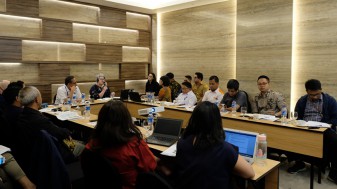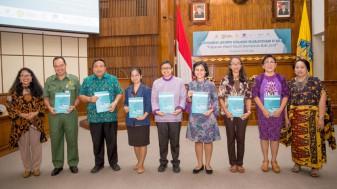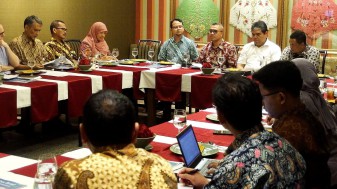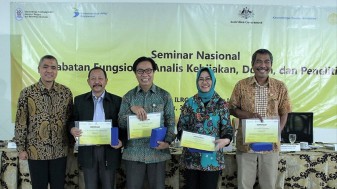One of the ways to build a sense of nationhood and tolerance is through Islamic education. The seeding of intolerance and radicalism can be prevented by an inclusive Islamic education system. However, in fact, the inculcation of exclusive religious values through Islamic education in schools is still abound. This has more or less contributed to radicalism and intolerance of students towards other religions. The core competencies and basic competencies as outlined in the Regulation of the Minister of Education and Culture Number 37 of 2018 already include teachings of tolerance. However, the content is not powerful enough, and it has not been able to seed inclusive religious values.
The Center for Islamic and Community Studies (PPIM) at Syarif Hidayatullah State Islamic University (UIN) Jakarta has been researching intolerance in Islamic education since 2016. Given the importance of Islamic education competence to frame the teaching method of Islamic education, in May 2019 PPIM UIN launched research on the competence of Islamic education in collaboration with the Research and Development Agency of the Ministry of Religion. This study produced a paper and three policy briefs to communicate its recommendations. Some of the research recommendations were then adopted by the Ministry of Education and Culture in the revision of competencies as contained in the Decree of the Minister of Education and Culture Number 958/P/2020 concerning Learning Achievement for Primary and Secondary Education issued on 20 October 2020. PPIM UIN is also actively involved in preparing the Islamic Religious Education Learning Focus with the National Education Standards Agency (BSNP). The PPIM UIN’s recommendations were adopted in the guideline on Islamic Religious Education Learning Focus published by BSNP in February 2021.
Encouraging initial steps
PPIM research found that previous Islamic education competencies did not adequately focus on promoting tolerance and respect for differences. For this reason, PPIM UIN recommends improving learning materials about citizenship morals in Islamic education. Today, Islamic Education competence has specifically stated that the aim of teaching Islamic education is to guide students to be pious and tolerant. The Ministry of Education and Culture also uses PPIM’s recommendations regarding the length of time to teach civics material so efforts to promote of tolerance can be maximized.
This change has been an important initial step for the government in realizing the need for Islamic education to teach tolerance and respect for differences. This competence is important because it serves as a reference for the Ministry of Education and Culture in developing textbooks and guiding teachers. Nonetheless, PPIM sees that significant effort is needed to ensure that these changes can be translated into better teaching. First, there is still much that needs to be improved regarding these competencies to promote tolerance and civics further. Second, teachers’ attitudes towards teaching approach also need to change. PPIM study found that teachers often had higher levels of intolerance than students.
Furthermore, the curriculum objectives in the Minister of Education and Culture Regulation Number 37 of 2018 include four competencies: spiritual, social, knowledge and skills. There are 684 basic competencies in Islamic religious education in the regulation. PPIM study found that the competencies were too many and unrealistic for students to achieve. Therefore, PPIM recommends simplification by reducing the number of competencies and focusing on core competencies and what is necessary to be covered within the available teaching hours. The Ministry of Education and Culture accepted this recommendation and the number of competencies in the revised regulation was reduced from 684 to 120 basic competencies.
Advocacy for tolerance content
From May 2019 to January 2020, PPIM conducted research on Islamic education compteence in collaboration with the Ministry of Religion Research and Development Agency. After the research was completed, between January and October 2020, PPIM UIN presented its research findings on several occasions to the three agencies responsible for revising these competencies: Directorate of Islamic Education (Ministry of Religion), Center for Curriculum and Books (Ministry of Education and Culture) and the National Education Standards Agency (BSNP). The three policy summaries produced by PPIM UIN were distributed to the three institutions.
This 26-year-old institution has long focused on strategic studies on religious life and education to influence policy and bring about societal change in Indonesia. Research on the issue of tolerance and Islamic religious education had started in 2016. Although PPIM has long advocated for the need for Islamic education to promote tolerance and respect for differences, there was not much traction from the main institutions. PPIM UIN’s research presentation in January 2020 on how competencies need to be revised to promote tolerance and respect for differences was an important critical juncture, because for the first time these institutions became aware of this problem. At that time, the three institutions also tended to be more receptive due to increasing public pressure triggered by an increase in cases of religious intolerance, including in schools.
In helping to raise awareness of MoRA’s Directorate of Islamic Education, the MoEC’s Center for Curriculum and Books, and the National Education Standards Agency (BSNP) of the need to simplify competencies, PPIM UIN shared that in every meeting with these policymakers, they immediately agreed to this recommendation. The three institutions claimed to have received similar responses from teachers, but PPIM UIN brought evidence to support this statement. MoEC’s Center for Curriculum and Books did not outright agree with PPIM UIN’s suggestion on how to reduce the number of competencies, but they do agree with the need for simplification.
From August to October 2020, MoRA’s Directorate of Islamic Education and MoEC’s Center for Curriculum and Books worked independently in revising their respective competencies. Although PPIM UIN was initially unaware that these institutions were working on competency revisions, follow up meetings in August and October 2020 confirmed that these institutions used PPIM UIN’s recommendations to inform their competency revisions.
There are other actors who also contributed to the change in policy besides PPIM UIN. Another contributing actor is the Center for Education and Policy Studies (PSPK), a think tank that focuses on education policy. Some of the prominent PSPK researchers are close friends of some PPIM researchers. PPIM always involves PSPK in workshops on the Islamic education curriculum. PSPK is directly involved by the Special Staff of the Minister of Education and Culture to provide input related to education policies. PSPK produced a side paper that also provides recommendations related to improving civic aspects in the competence of Islamic religious education. PPIM UIN believes that the revision of competencies was informed by PPIM UIN’s research results and recommendations.
Through studies related to the Core Curriculum and the Basic Curriculum for Islamic Religious Education, PPIM UIN is also actively involved in preparing the Islamic Religious Education Learning Focus with the BSNP. The two main recommendations put forward by PPIM UIN were adopted in the guideline, particularly the guideline for Senior High School (SMA) grades X to XII. The two recommendations adopted include the point that students are expected to become religious people who are devout individually and socially useful and have an active role as citizens, as well as the point to foster an attitude of respect for differences in beliefs and identify positive morals in interacting with people with different beliefs. With the adoption of recommendations from PPIM UIN, the guideline for Islamic Religious Education Learning Focus now has a strong content of tolerance to foster an attitude of respect for differences in beliefs and religions.
Knowledge Sector Initiative (KSI) Contribution
KSI contributed to this policy process by providing funding that enabled PPIM UIN to continue research and advocacy on Islamic education for several years, including research and advocacy in 2019 and 2020 on Islamic education competencies. KSI’s involvement has also built PPIM UIN’s awareness on the importance of engaging policymakers to ensure that their research influences policy. During the KSI program logic session with PPIM UIN, KSI encouraged PPIM UIN to strengthen stakeholder involvement, so PPIM UIN decided to conduct joint research with MoRA’s Research and Development Agency. KSI also encouraged PPIM UIN to expand their involvement with other government agencies relevant to this process, in this case, the Ministry of Education and Culture and BSNP, and helped PPIM UIN to connect with relevant contacts within BSNP.






